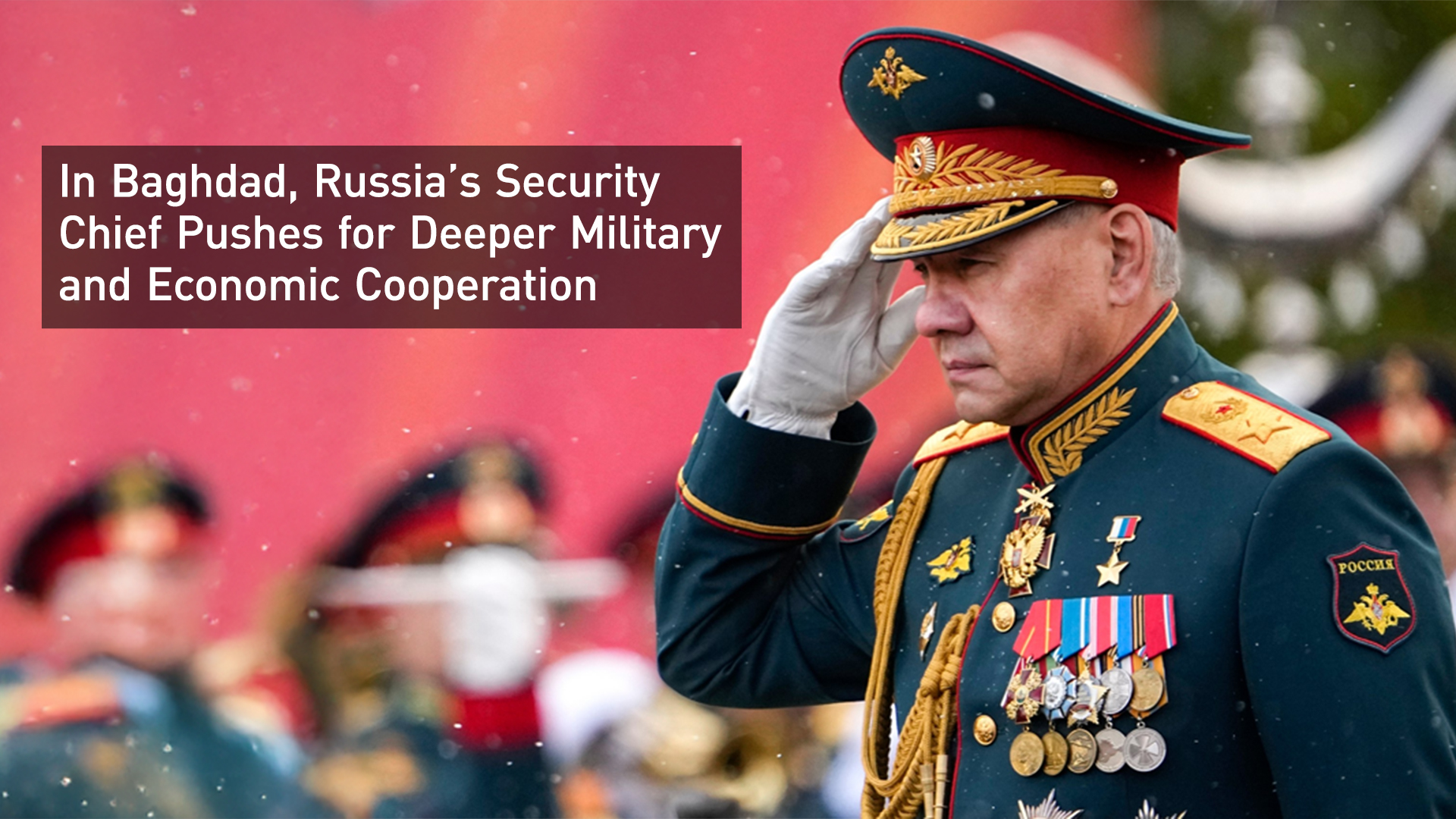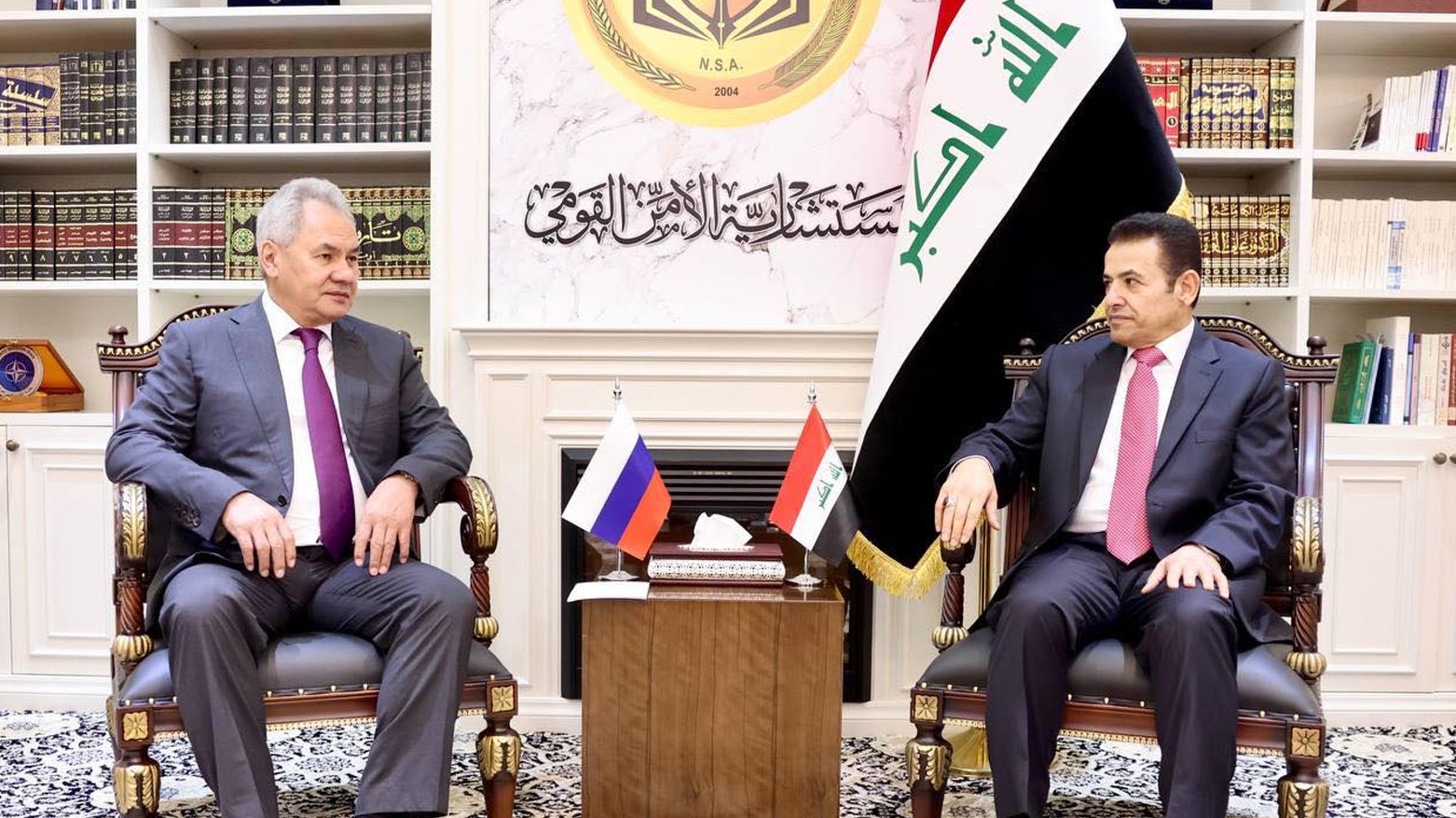Shoigu in Baghdad to Deepen Security Ties as Iraq Navigates Treacherous Regional Currents
Russia’s top security official has arrived in Baghdad for talks on expanding military and security cooperation. Sergey Shoigu’s visit comes as Iraq balances deepening ties with Moscow, U.S. pressure over Iran-aligned militias and escalating regional tensions after Israel’s strike in Qatar.

ERBIL (Kurdistan24) – Russian Security Council Secretary Sergey Shoigu arrived in Baghdad on Tuesday for high-level talks with Iraq's top political and military leadership, a visit aimed at significantly strengthening and expanding security and military cooperation at a moment of profound flux and heightened tension across the Middle East, according to Russian State News Agency TASS.
Announcing that contacts between Moscow and Baghdad are becoming "more intense and multidirectional," as reported by TASS, Shoigu's visit signals a deliberate Russian move to deepen its strategic partnership with an Iraqi government that is navigating a treacherous landscape of internal political pressures, shifting regional alliances, and the ever-present influence of competing global powers.
The visit, confirmed by the Russian state news agencies TASS and Sputnik, will see Shoigu convey Moscow's intention to "further strengthen and expand cooperation in the security area," with discussions set to cover a wide range of bilateral and regional issues.
In Baghdad, National Security Advisor Qasim al-Araji formally welcomed Shoigu and the Russian delegation in the presence of Moscow’s ambassador, where he underscored Iraq’s intention to broaden cooperation with “all countries of the world” in pursuit of shared interests.
According to a statement published by al-Araji’s media office, the talks focused on enhancing bilateral ties and sustaining collaboration across multiple fields, including defense and security.
The meeting also prepared the ground for a highly anticipated encounter between Prime Minister Mohammed Shia al-Sudani and Russian President Vladimir Putin, scheduled to take place on the sidelines of the upcoming Arab summit in Moscow.
Discussions between Araji and Shoigu included a wide range of topics such as border security, cybersecurity, counterterrorism, and combating narcotics, as well as recent regional developments.
The officials emphasized their commitment to diplomatic solutions for ending the Gaza conflict, while Araji reaffirmed Iraq’s seriousness about strengthening economic, security, and strategic cooperation with Russia.

"Contacts are becoming more intense and multidirectional. This concerns business, economy, and transport, military and military-technical cooperation," Shoigu stated during a brief conversation with the deputy adviser to the Iraqi Prime Minister on national security upon his arrival. "I hope that today there will be a good constructive conversation," he added.
The visit comes amid deepening Russia–Iraq diplomatic ties, highlighted by last year’s commemoration of the 80th anniversary of their relations, when Russian Foreign Minister Sergey Lavrov attended an exhibition dedicated to the milestone. It underscores a concerted effort to strengthen and build upon a long-standing and historically robust partnership.
The arrival of Shoigu, a pivotal figure in Russia's security establishment, comes against the backdrop of an incredibly volatile and complex regional environment, in which Iraq finds itself at the center of multiple overlapping regional currents.
The geopolitical ground has shifted dramatically in recent days, most notably with Israel's daring and unprecedented strike targeting the senior leadership of Hamas in Doha, Qatar.
As reported by Kurdistan24, the attack on the capital of a key regional mediator has dramatically escalated the conflict, with Israel launching coordinated strikes across multiple fronts, including military sites in Syria and Hezbollah-linked elements in Lebanon, all within a 24-hour period.
The Israeli strikes on Qatar have elicited widespread regional and international reactions and condemnations. The Prime Minister of the Kurdistan Region was among the first to denounce the attacks, describing them as a “violation of international law.”
This new phase of Israeli military assertiveness is being carried out with the "unwavering support" of the United States, as publicly declared by U.S. Secretary of State Marco Rubio, who stressed that peace in Gaza cannot begin until Hamas is eradicated.
The strikes on Qatar can also be interpreted within the context of the intensifying Israeli–Iranian shadow war, which has increasingly spilled into the open—particularly after the recent 12-day conflict between the two states. This escalation carries profound and potentially dangerous implications for Iraq, which has long served as a central arena in this regional rivalry.
The strikes on Qatar have amplified fears within Iraq that foreign military action against Iran-aligned militias on its own soil is now a very real possibility.
As Kurdistan24 has previously reported, Iraqi security experts have been warning for months that a foreign military strike against these armed groups is "highly likely" and may be the "only way to control the situation."
These warnings have been sharpened by a relentless wave of drone attacks targeting the Kurdistan Region’s energy infrastructure and U.S. interests — a stark escalation against a region widely regarded as Washington’s closest and most reliable partner in Iraq. The attacks, widely attributed to these same militia groups, not only threaten critical economic assets but also seek to undermine the enduring U.S.–Kurdistan alliance.
Additionally, the threat of external intervention is directly linked to a major internal political battle over the future of the Popular Mobilization Forces (PMF), or Hashd al-Sha'bi. A highly controversial bill aimed at restructuring and expanding the powers of the PMF, which would have granted it the ability to establish its own military academy and engage in commercial activities, was recently postponed by the Iraqi government.
As Kurdistan24 detailed, this postponement came after intense and public U.S. pressure, with Washington warning that the bill would entrench Iranian influence and undermine Iraq's sovereignty.
The decision to shelve the bill highlighted the immense external and internal pressures on Baghdad and the deep divisions within the ruling coalition itself.
While the government of Iraq’s Prime Minister Mohammed Shia al-Sudani has publicly affirmed its commitment to the principle of exclusive state control over arms, the practical ability to rein in these powerful non-state actors remains a central and unresolved challenge to Iraqi sovereignty.
As Baghdad navigates this delicate balancing act with Washington and the militias, it is also actively reinforcing its strategic ties with Tehran.
Just last month, Ali Larijani, the influential Secretary-General of Iran's Supreme National Security Council, visited Baghdad to sign a key border security pact.
This move, as previously reported by Kurdistan24, was a clear signal of Iran's commitment to maintaining its deep security and political relationship with Iraq, creating a complex diplomatic triangle that Shoigu's visit now enters.
The release of Israeli–Russian academic Elizabeth Tsurkov after 903 days in captivity highlights the intricate and often opaque dynamics of Iraq’s security landscape as well. Baghdad initially framed the development as the result of its own security efforts, yet U.S. President Donald Trump publicly credited the Iran-backed militia Kataeb Hezbollah with securing her freedom.
This public contradiction underscored the persistent fragmentation of authority within Iraq and the limited capacity of the central government to assert effective control over powerful militia networks aligned with external actors.
This development coincides with recent announcements that the U.S. military presence in Iraq is being reduced in line with the U.S.–Iraq agreement, which revises the previously negotiated timeline for winding down the International Coalition’s mission.
Washington and Baghdad are shifting from coalition-led operations to a bilateral security partnership. Although Operation Inherent Resolve is set to conclude in 2025, a phased drawdown extending into 2026 will retain a limited U.S. presence focused on training, intelligence-sharing, and counterterrorism efforts — a transition of mission rather than a full withdrawal.
It is into this maelstrom of security dilemmas and diplomatic pressures that Russia is now asserting itself as a key partner.
Moscow's offer to expand military-technical cooperation provides Baghdad with an alternative to its heavy reliance on the West, a strategic option at a time when its relationship with Washington is strained over the issue of the militias.
This diplomatic and security engagement is also taking place as Iraq aggressively pursues a new phase of economic opening to the West.
The Iraqi Ministry of Oil recently announced the signing of major contracts with international energy giants, including the American company Chevron and the British company BP, to develop crucial oil fields in Nasiriyah and Kirkuk.
These deals, aimed at revitalizing Iraq's energy sector, are not without their own internal political controversies, with the Kurdistan Regional Government having previously labeled the unilateral deal in the disputed territory of Kirkuk as "unconstitutional."
Sergey Shoigu's high-stakes visit to Baghdad, therefore, is far more than a routine diplomatic exchange. It is a strategically significant move by Moscow to position itself as an indispensable security partner for an Iraqi government that is simultaneously trying to attract Western investment, manage the destabilizing influence of powerful internal militias, and navigate the treacherous crosscurrents of a region on the brink of a wider war.
This article has been updated.